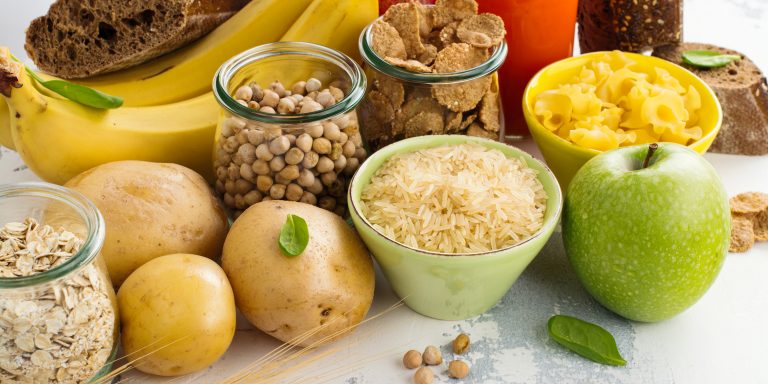
Carbohydrates – definition, types and nutrition
Why do our bodies need carbohydrates? What are fast-acting carbohydrates? What is a rich source of carbohydrates? What quantity of carbohydrates should you consume in a day? Find out more about carbohydrates in your diet.
Carbohydrates: what are they?
Carbohydrates consist of carbon, hydrogen and oxygen, and are made up of chains of sugar molecules of varying lengths. They are primarily found in plant-based foods. Carbohydrates are a source of energy – the fuel for our muscles and brain. The body transports them to all of our cells via the bloodstream. If we don’t need the carbohydrates right away, the body stores them in our liver and muscles as glycogen. Carbohydrates provide 4 kilocalories per gram.
And what are carbs? “Carbs” is just short for “carbohydrates”. That’s why we also talk about a low-carb diet, in which only small quantities of carbohydrates are consumed. At the other end of the scale, carb-loading involves consuming very large quantities of carbohydrates. The terms “low-carb” and “carb-loading” are widely used, especially in the field of sports nutrition.
Types of carbohydrates
There are different types of carbohydrates, and they can be divided into two main categories: simple, short-chain carbohydrates, and complex, long-chain carbohydrates. They differ in terms of the number of sugar molecules they contain.
Complex carbohydrates are slow-acting. The body cannot break them down as quickly, so they keep us feeling full for longer. Simple carbohydrates, on the other hand, are fast-acting and don’t keep us feeling full for long.
What are simple carbohydrates?
What do simple carbohydrates do? Simple carbohydrates are short-chain molecules that are easy to digest. Our bodies quickly break them down and absorb them into our blood, where they stimulate the release of insulin. Once this insulin has been released, our blood sugar level soon returns to normal. That’s why we also call simple carbohydrates “fast-acting”. They provide an instant energy boost, but they don’t keep you feeling full for long, which can lead to cravings.
Simple, short-chain carbohydrates are made up of a small number of sugar molecules.
- Monosaccharides consist of just one sugar molecule. They include fructose and glucose, for example.
- Disaccharides are made up of two sugar molecules. They include table sugar (sucrose) and milk sugar (lactose).
Did you know that, chemically, the artificial sweeteners sorbitol and xylitol are sugar alcohols? These don’t cause blood sugar levels to rise. You can turn to these artificial sweeteners if you don’t want to do without sugar. This won’t stop you craving sugar, however! Your best bet is therefore to opt for naturally sweet foods, or simply less sweet products.
What are complex carbohydrates?
Complex carbohydrates are made up of long chains of sugar molecules. The body has to break them down before they can be digested. What role do complex carbohydrates play in the body? They enter the bloodstream slowly and evenly. Complex carbohydrates don’t cause blood sugar levels to rise as quickly, and keep you feeling full for longer. That’s why we also call them “slow-acting”. They are also an important source of fibre.
Complex, long-chain carbohydrates are made up of long chains of simple sugars.
- Oligosaccharides are carbohydrates consisting of three to nine sugar molecules.
- Polysaccharides are made up of ten or more sugar components. Starch and dietary fibre are polysaccharides.
What does the body need carbohydrates for?
Carbohydrates have an important role to play in the body. Alongside fats and proteins, they are a source of energy for the body. This is important for metabolic processes and the functioning of our organs.
What different types of carbohydrates can be found in our food?
The most important carbohydrates in our food include both short-chain and long-chain carbohydrates. This list provides an overview:
Glucose
Glucose is only found in small quantities in its free state, for example in fruit and honey. It is often combined with other carbohydrates such as sucrose or lactose. The small intestine absorbs glucose and transports it to the body’s cells, which it supplies with energy. Glucose is even the most important source of energy for the brain and red blood cells.
Fructose
Fruit and honey naturally contain fructose. It is also used to sweeten drinks and yoghurt. When consumed in large quantities, however, it can sometimes cause flatulence and diarrhoea, because the gut can only handle a certain amount of it.
Lactose
Lactose is only found in breast milk and the milk of mammals. In the small intestine, an enzyme called lactase breaks down lactose into glucose and galactose. People with lactose intolerance have no lactase at all or only small amounts of it in their small intestine, which means that they are unable to break down lactose. This causes problems such as flatulence, stomach aches or diarrhoea.
Dietary fibre
Dietary fibre is not digested. In other words, it is not broken down or absorbed in the small intestine. Instead, dietary fibre serves as a source of food for your gut bacteria, which metabolise it. What do our bodies need this kind of carbohydrate for? Dietary fibre makes us feel fuller, and has a positive impact on our blood sugar levels. It delays the absorption of nutrients in the small intestine, which reduces the amount of insulin released. It also benefits our gut flora, and can reduce the levels of lipids and cholesterol in our blood. Experts recommend that adults eat 30 grams of fibre a day. Wholegrain products, pulses, nuts, fruit, vegetables, wheat bran, flax seeds, chia seeds, white beans, soy protein, lentils and peas are good sources of fibre.
How much carbohydrate do we need?
The Federal Food Safety and Veterinary Office (FSVO) and Swiss Society for Nutrition (SSN) recommend that around 45% to 55% of your daily energy intake should come from carbohydrates. The quantity of carbohydrates that a person needs each day depends on their gender and energy requirements.
For example: adult women, who need 1800 calories, should ideally consume between 200 and 250 g of carbohydrates each day. Adult men, who need 2200 calories, should ideally consume between 200 and 300 g of carbohydrates per day. Your body stores surplus carbohydrates as glycogen in your liver and muscles, or as fat.
What is the glycaemic index?
The glycaemic index (GI) tells us how quickly and to what extent a food containing carbohydrates causes blood sugar levels to rise. This means it shows which carbohydrates cause blood sugar levels to rise more slowly, and are therefore more healthy for your metabolism. The lower the GI value, the healthier the food.
Keep the following tips in mind with regard to the GI:
- Try to focus on natural foods that have been processed as little as possible.
- Enjoy fruits and vegetables raw.
- Always opt for wholegrain versions if possible, for example by choosing brown instead of white bread.
- Combine foods that are high in carbohydrates with others containing fat and protein.
However, the GI does not tell us how much carbohydrate food contains, meaning it cannot always be applied in practice. The glycaemic load (GL), on the other hand, not only takes into account the type of carbohydrate, but also the food’s carbohydrate content.
Please note that GI and GL values tell us which carbohydrate-rich foods are suitable and which are not, but you shouldn’t use them to judge all foods. They don’t tell you anything about low-carbohydrate foods, for example.
Which carbohydrates are healthy?
Complex, long-chain carbohydrates are healthy. They keep you feeling full for longer because they enter the bloodstream slowly and evenly.
These foods contain healthy carbohydrates:
- Grains
- Pulses (peas, lentils, beans)
- Nuts and almonds
- Kernels and seeds (flax seeds, pumpkin seeds)
- Potatoes
- Wholemeal bread
- Oatmeal and other cereals
- Quinoa
- Fruit and vegetables (apples, bananas, spinach, cauliflower)
Which carbohydrates should you enjoy in moderation?
Refined carbohydrates, in particular, are unhealthy. These are simple, short-chain carbohydrates that can mainly be found in highly processed foods.
These foods contain refined carbohydrates:
- Sweets like gummy bears or popcorn
- Fast food
- Ready meals
- Jam
- Crisps
- White bread
- Sugary drinks
Carbohydrates in your diet: tips
If you would like to include more healthy carbohydrates in your diet, you should bear the following in mind:
- When you’re grocery shopping, pay attention to the nutrition information on “carbohydrates – of which sugar”. This value should be as low as possible.
- Focus on complex carbohydrates, and try to reduce the amount of processed products that you eat. As a general rule, the wholegrain versions of foods (such as bread and pasta) are always the better choice.
- Incorporate pulses, such as beans, lentils and chickpeas, into your meals as often as you can.
- Eat fruit and vegetables regularly – unpeeled if possible. Vegetables in particular contain a lot of fibre.
- Consult a dietician or nutritionist if necessary. They can help you change your diet in the long term.
Would you like to make long-term changes to your diet?
If so, nutrition counselling will help
You will learn how you can develop and maintain healthy eating habits.
Helsana will contribute 75% (up to CHF 200 per calendar year) towards the costs of SVDE nutrition counselling and courses from Weight Watchers, eBalance.ch, Oviva, My Coach and Betty Bossi under SANA and COMPLETA supplementary insurance policies.
Your basic insurance covers the costs of prescribed nutrition counselling, minus the deductible and excess. The counselling must be provided by a recognised dietitian or nutritionist, and fulfil certain criteria. Ask your attending physician about these criteria.
By making sure you eat complex carbohydrates every day, you can support important functions of your body. You should make sure that you get a good variety and quality of carbohydrates as a first step towards maintaining a balanced diet.

The specialist provided the editorial team with advice and input for this article. Andrea Bovisi (BSc BFH dietitian) works in the Helsana Health Consultation Service. She also helps customers on issues to do with nutrition and healthy living.


Newsletter
Find out more about current health issues every month and get all the information you need about our attractive offers from all Helsana Group companies * delivered by e-mail to read whenever it suits you. Our newsletter is free of charge and you can sign up here:
We did not receive your information. Please try again later.
* The Helsana Group comprises Helsana Insurance Company Ltd, Helsana Supplementary Insurances Ltd and Helsana Accidents Ltd.